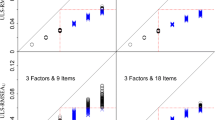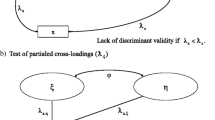Abstract
This study examined the performance of two alternative estimation approaches in structural equation modeling for ordinal data under different levels of model misspecification, score skewness, sample size, and model size. Both approaches involve analyzing a polychoric correlation matrix as well as adjusting standard error estimates and model chi-squared, but one estimates model parameters with maximum likelihood and the other with robust weighted least-squared. Relative bias in parameter estimates and standard error estimates, Type I error rate, and empirical power of the model test, where appropriate, were evaluated through Monte Carlo simulations. These alternative approaches generally provided unbiased parameter estimates when the model was correctly specified. They also provided unbiased standard error estimates and adequate Type I error control in general unless sample size was small and the measured variables were moderately skewed. Differences between the methods in convergence problems and the evaluation criteria, especially under small sample and skewed variable conditions, were discussed.
Similar content being viewed by others
References
Arnold-Berkovits, I.: Sturctural modeling with order polytomous and continuous variables: a simulation study comparing full-information Bayesian estimation to correlation/covariance methods. Unpublished doctoral dissertation, University of Maryland (2002)
Bentler P.M. (2004). EQS 6 Structural Equations Program Manual. Multivariate Software, Inc., Encino, CA
Bentler P.M. (2006). EQS 6 Structural Equations Program Manual. Multivariate Software, Inc., Encino, CA
Bentler P.M. and Wu E.J.C. (2004). EQS 6 for Windows User’s Guide. Multivariate Software, Inc., Encino, CA
Bentler P.M. and Yuan K.-H. (1999). Structural equation modeling with small samples: test statistics. Multivariate Behav. Res. 34: 181–197
Bollen K.A. (1989). Structural Equations with Latent Variables. John Wiley & Sons, Inc., New York, NY
Bradley J.V. (1978). Robustness?. Br. J. Math. Statis. Psychol. 31: 144–152
Brown R.L. (1989). Using covariance modeling for estimating reliability on scales with ordered polytomous variables. Educ. Psychol. Measure. 49: 385–398
Chen F., Bollen K.A., Paxton P., Curran P.J. and Kirby J.B. (2001). Improper solutions in structural equation models: causes, consequences, and strategies. Sociol. Methods Res. 29(4): 468–508
Coenders G., Satorra A. and Saris W.E. (1997). Alternative approaches to structural modeling of ordinal data: a Monte Carlo study. Struct. Eq. Model. 4(4): 261–282
Curran P.J., Bollen K.A., Paxton P., Kirby J. and Chen F. (2002). The noncentral chi-square distribution in misspecified structural equation models: finite sample results from a Monte Carlo simulation. Multivariate Behav. Res. 37(1): 1–36
Curran P.J., West S.G. and Finch J.F. (1996). The robustness of test statistics to nonnormality and specification error in confirmatory factor analysis. Psychol. Method 1(1): 16–29
DiStefano C. (2002). The impact of categorization with confirmatory factor analysis. Struct. Eq. Model. 9(3): 327–346
Flora D.B. and Curran P.J. (2004). An empirical evaluation of alternative methods of estimation for confirmatory factor analysis with ordinal data. Psychol. Method 9(4): 466–491
Hoogland J.J. and Boomsma A. (1998). Robustness studies in covariance structural modeling: an overview and a meta-analysis. Sociol. Method Res. 26: 329–367
Lee S.-Y., Poon W.-Y. and Bentler P.M. (1995). A two-stage estimation of structural equation models with continuous and polytomous variables. Br. J. Math. Statis. Psychol. 48: 339–358
Micceri T. (1989). The unicorn, the normal curve and other improbable creatures. Psychol. Bull. 105(1): 156–166
Muthén B.O. (1984). A general structural equation model with dichotomous, ordered categorical and continuous latent variable indicators. Psychometrika 49: 115–132
Muthén B.O. (1993). Goodness of fit with categorical and other non-normal variables. In: Bollen, K.A. and Long, J.S. (eds) Testing Structural Equation Models, pp 205–243. Sage, Newbury Park, CA
Muthén, B.O.: Mplus Technical Appendices. Muthén & Muthén, Los Angeles, CA (1998–2004).
Muthén, B.O., du Toit, S.H.C., Spisic, D.: Robust inference using weighted least squares and quadratic estimating equations in latent variable modeling with categorical and continuous outcomes. Psychometrika (in press)
Muthén B., Kaplan D. and Hollis M. (1987). On structural equation modeling with data that are not missing completely at random. Psychometrika 52: 431–462
Muthén, L.K., Muthén, B.O.: Mplus User’s Guide, 3rd edn. Muthén & Muthén, Los Angeles, CA (1998–2004)
Nevitt J. and Hancock G.R. (2004). Evaluating small sample approaches for model test statistics in structural equation modeling. Multivariate Behav. Res. 39(3): 439–478
Olsson U. (1979). Maximum likelihood estimation of the polychoric correlation coefficient. Psychometrika 44: 443–460
Satorra A. and Bentler P.M. (1994). Corrections to test statistics and standard errors in covariance structure analysis. In: Clogg, C.C. (eds) Latent variables analysis: applications for developmental research, pp 399–419. Sage, Thousand Oaks
Yuan K.H. and Bentler P.M. (1998). Normal theory based test statistics in structural equation modeling. Br. J. Math. Statis. Psychol. 51: 289–309
Author information
Authors and Affiliations
Corresponding author
Rights and permissions
About this article
Cite this article
Lei, PW. Evaluating estimation methods for ordinal data in structural equation modeling. Qual Quant 43, 495–507 (2009). https://doi.org/10.1007/s11135-007-9133-z
Received:
Accepted:
Published:
Issue Date:
DOI: https://doi.org/10.1007/s11135-007-9133-z




